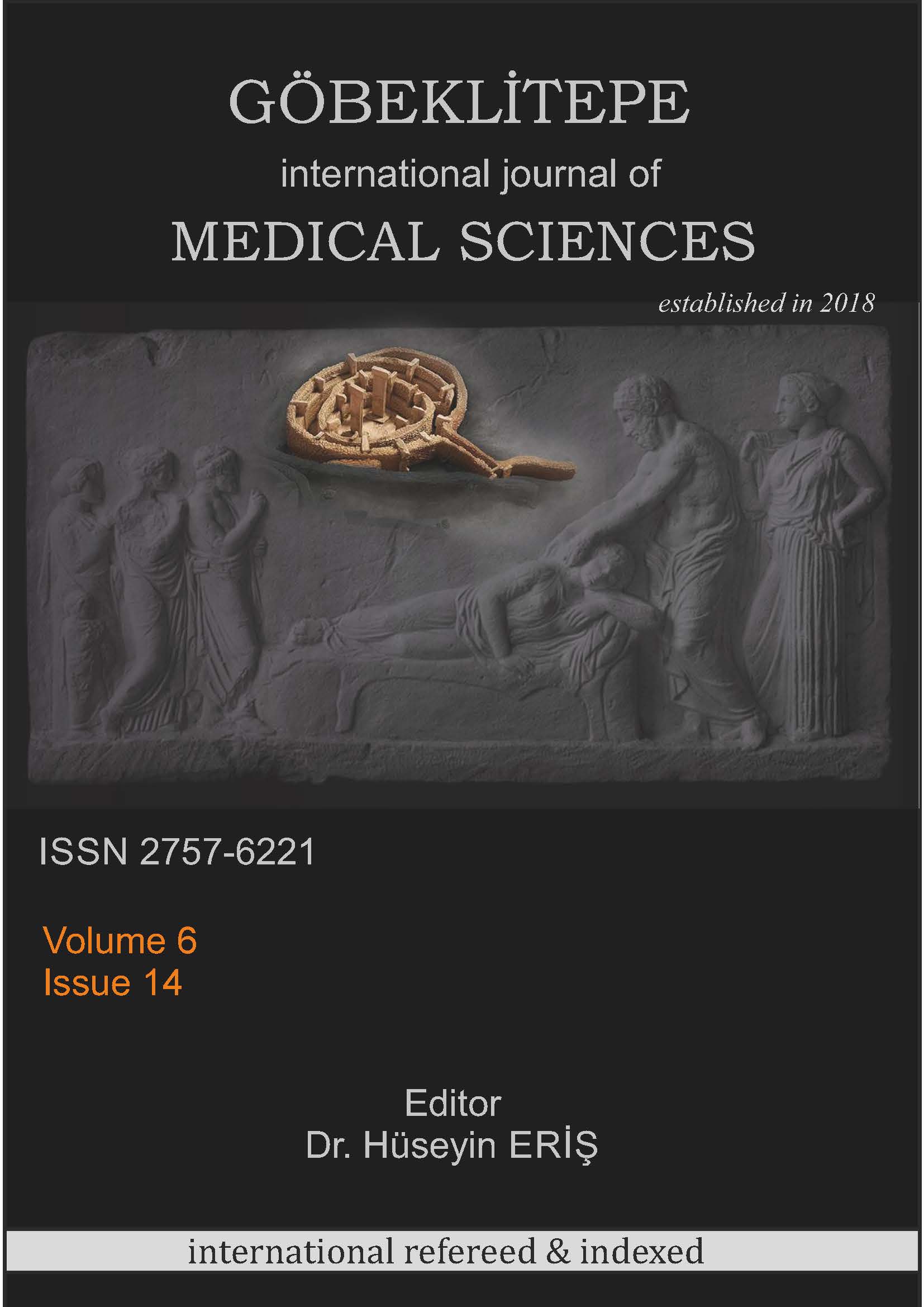DETERMİNİNG WOMEN'S ECOLOGİCAL FOOTPRİNT AWARENESS BY GENERATİONS
Women's Ecological Footprint Awareness
DOI:
https://doi.org/10.55433/gsbd/241Keywords:
Ecological Footprint, Woman, GenerationAbstract
This study aimed to determine the ecological footprint awareness of women according to generations. This descriptive study was conducted between March and April 2023. The sample of the study consisted of 345 women (115 X, 115 Y, 115 Z generation) living in Turkey, who were not diagnosed with mental disorders and accepted to participate in the study. Data were collected online using the Personal Information Form and the Ecological Footprint Awareness Scale via Google Form. The data were evaluated with SPSS 25 Programme, using descriptive statistics as well as Chi-square and Kruskal Wallis test statistics. Women's Ecological Footprint Awareness Scale mean total score was 117.3 ± 29.73, and the median was; It was determined as 121 (30- 150). The median total score of Ecological Footprint Awareness of the women in the X generation was significantly higher than the women in the Y and Z generation (p<0.001). In the comparison of the sub-dimensions of the Ecological Footprint Awareness scale according to generations; It was determined that the sub-dimension score medians of Energy, Recycling, Transportation, Food and Water Consumption were significantly higher for the women in the X generation than the women in the Y and Z generation (p<0.05). In this study, it was determined that the awareness of ecological footprint increased with the increasing age of women. It is recommended to plan trainings to increase awareness of the ecological footprint of women in the young age group and to carry out group studies involving women from different generations.
References
Galli A, Katsunori Iha, Sara Moreno Pires, Maria Serena Mancini, Armando Alves, Golnar Zokai, David Lin, Adeline Murthy, Mathis Wackernagel. Portekiz şehirlerinin ekolojik ayak izinin ve biyolojik kapasitesinin değerlendirilmesi: Çevre bilinci ve yerel yönetim için kritik sonuçlar. Science Direct. 2020;96 doi: 10.1016/j.cities.2019.102442. (https://www.sciencedirect.com/science/article/pii/S0264275119302306)
Lee Y J, Chai L, Wu P S. Taiwan’s ecological footprint and overshoot day. Scientific reports. 2021: 11(1); 15068. https://doi.org/10DOI: 10.1038/s41598-021-94540-7
Dam TA, Pasche M, Werlich N. Trade patterns and the ecological footprint a theory-based empirical approach. Jena Economic Research Papers. 2017;5:1–37. doi:
WWF. Türkiye’nin Ekolojik Ayak İzi Raporu. Global Footprint article_uploads/Turkey_Ecological_Footprint_Report_Turkish. Erişim tarihi: 28.05.2023 http://www.footprintnetwork.org/images/
Çelik G, Çam H. Ekolojik ayak izini etkileyen faktörlerin belirlenmesine yönelik bir yapısal model önerisi . Selçuk Üniversitesi Sosyal Bilimler Meslek Yüksekokulu Dergisi. 2022; 25 (1) :201-215. doi:10.29249/selcuksbmyd.1103235
Eraslan Ş, Seçme D. Mimarlık fakültesi öğrencilerinin ekolojik ayak izi farkındalık düzeyi. Süleyman Demirel Üniversitesi Fen Bilimleri Enstitüsü Dergisi. 2021;25(3): 481-491. doi: 10.19113/sdufenbed.801151
Engin K, Demiriz S, Koçyiğit B S. Okul öncesi öğretmenlerinin ekolojik ayak izi farkındalıkları, çevre dostu davranışları ve çevre dostu etkinlikler uygulama durumları arasındaki ilişkinin incelenmesi. Marmara Üniversitesi Atatürk Eğitim Fakültesi Eğitim Bilimleri Dergisi. 2023;57 (57): 91-108. doi: 10.15285/maruaebd.1120458
Eren Ö, Parlakay O P, Hilal M, Bozhüyük B. Ziraat fakültesi akademisyenlerinin ekolojik ayak izinin belirlenmesi: Mustafa Kemal Üniversitesi örneği . Journal of Agricultural Faculty of Gaziosmanpaşa University (JAFAG). 2017; 34 (2) : 138-145. doi: 10.13002/jafag4315
http://www.tdk- .gov.tr. Erişim tarihi: 15.03.2023
Gıcır B, Oruç I, Özatlı N S. X, Y, Z Kuşaklarının çevre davranış düzeylerinin farklı değişkenlere göre incelenmesi: Balıkesir Örneği. Eğitim ve Toplum Araştırmaları Dergisi. 2020:7(2):491-516.doi:Retrievedfrom https://dergipark.org.tr/en/pub/etad/issue/58757/777624
Temizkan R. Ceyhanlı K. Turizm lisans öğrencilerinin ekolojik ayak izi farkındalıkları. Turizm Akademik Dergisi.2020:7(2);203-223. Retrieved from https://dergipark.org.tr/tr/pub/touraj/issue/58493/629480
Zhang H, Ke H. Understanding the heterogeneous impact of innovation efficiency on urban ecological footprint in China. International journal of environmental research and public health. 2022:19(10),;6054. doi: https://doi.org/10.3390/ijerph19106054
Kaypak Ş. Ekolojik ayak izinden çevre barışına bakmak . Türk Bilimsel Derlemeler Dergisi. 2013: (1); 154-159. Retrieved from https://dergipark.org.tr/en/pub/derleme/issue/35088/389194
Şimşek T. Bazı demografik özelliklere göre liseli gençlerin ekolojik ayak izi farkındalıkları ve çevre dostu davranışları. Sosyal Bilimler Akademi Dergisi. 2020:3(2);139-169. doi: 10.38004/sobad.765328
Demirkol M, Aslan İ. Sınıf öğretmenlerinin ekolojik ayak izi farkındalık düzeyleri . Journal of Computer and Education Research. 2021;9 (18):904-928 . doi: 10.18009/jcer.901915
Tekindal M A, Zabzun G, Özel Z, Demirsöz M, Tekindal M. Awareness scale for reducing ecological footprint. A validity and reliability study. European Journal of Science and Technology. 2021;(27);439-445.
Chirilli C, Molino M, Torri L. Consumers’ awareness, behavior and expectations for food packaging environmental sustainability: Influence of Socio-Demographic Characteristics. Foods. 2022;11(16):2388. doi:10.3390/foods11162388
Ünal M, Ünal F. Ecological footprint reduction behaviors of individuals in Turkey in the Context of ecological sustainability. Sustainability. 2022:15(1);63. https://doi.org/10.3390/su15010063
Özgen U, Aksoy A D. Tüketicilerin ekolojik ayak izi farkındalık düzeyleri (Ankara İli Örneği). Third Sector Social Economic Review. 2017:52(3);46-65.
Gürbüz İ B, Nesirov E, Ozkan G. Investigating environmental awareness of citizens of Azerbaijan. A survey on ecological footprint”. Environment Development and Sustainability. 2020: 23(7);10378-103961. doi: 10.1007/s10668-020-01061-w
Chin YSJ, De Pretto L, Thuppil V, Ashfold MJ. Public awareness and support for environmental protection-A focus on air pollution in peninsular Malaysia. PLOS ONE. 2019;14(3). Doi:e0212206. https://doi.org/10.1371/journal.pone.0212206
Uyar M, Kasapoğlu E, Demir G S. Konya’da aile sağlığı merkezlerine başvuran yetişkinlerin su tasarrufu ile ilgili bilgi, tutum ve davranışları . Afet ve Risk Dergisi 2023: 6 (1) ;294-304. doi: 10.35341/afet.1159031
Eti İçli G, Anıl N K, Kılıç B. Tüketicilerin organik gıda satın alma tercihlerini etkileyen faktörler. Kırklareli Üniversitesi İktisadi ve İdari Bilimler Fakültesi Dergisi. 2016;5(2):93-108.
Da Silva JT, Garzillo JMF, Rauber F, Kluczkovski A, Rivera XS, da Cruz GL, Frankowska A, Martins CA, da Costa Louzada ML, Monteiro CA, Reynolds C, Bridle S, Levy RB. Greenhouse gas emissions, water footprint, and ecological footprint of food purchases according to their degree of processing in Brazilian metropolitan areas. The Lancet. Planetary health.2021; 5(11): e775–e785. doi: https://doi.org/10.1016/S2542-5196(21)00254-0
Aktaş S, Çiçek B. Farklı kuşaktaki kadın ve erkeklerin sürdürülebilir tüketim davranışlarının incelenmesi. Third Sector Social Economic Review. 2019; 54(4):1957-1978. doi:10.15659/3.sektor-sosyal-ekonomi.19.12.1264
Sarıtürk B, Sivri N, Şeker D Z. Türkiye’deki geomatik mühendisleri arasında yaşam standartları ve karbon ayak izi arasındaki ilişkinin belirlenmesi. TMMOB Harita ve Kadastro Mühendisleri Odası, 15. Türkiye Harita Bilimsel ve Teknik Kurultayı.2015
Liu A, Osewe M, Wang H, Xiong H. Rural residents’ awareness of environmental protection and waste classification behavior in Jiangsu, China: An Empirical Analysis. International journal of environmental research and public health. 2020:17(23);8928. https://doi.org/10.3390/ijerph17238928
Downloads
Published
How to Cite
Issue
Section
License
Copyright (c) 2024 Göbeklitepe Sağlık Bilimleri Dergisi

This work is licensed under a Creative Commons Attribution 4.0 International License.




